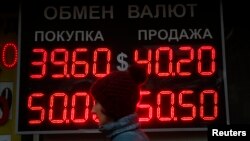After several rounds of international sanctions against Russia for its annexation of Ukraine’s Crimean peninsula in March and support of pro-Russian separatists in eastern Ukraine, experts are divided over whether they are working.
“It depends on what your understanding of the purpose of sanctions is,” said Matthew Rojansky with the Washington-based Wilson Center. “My understanding is that it’s mostly intended to change behavior, to deter bad behavior. And in that sense probably not, probably it hasn’t worked.”
Anders Aslund, a Russia expert with the Peterson Institute for International Economics, said the first round of sanctions targeted people and enterprises either directly involved in Crimea’s annexation, or close to Russian President Vladimir Putin.
“And since July, these sanctions have gone much further dealing with whole sectors of the Russian economy, notably finance, high tech, the energy sector and the defense sector,” Aslund said.
Aslund said normally sanctions do have an economic effect but do not necessarily have the desired political effect. He said the Russian economy is likely to be stagnant this year and probably will gradually decline in the next few years.
Foreign debt
“The big problem Russia has - its big vulnerability - is that Russia has a foreign indebtedness of $730 billion, which is a lot of money - that is about 40 percent of its current gross domestic product,” Aslund said. “And it needs to refinance this to the tune of $160 billion a year and this money is not available now.”
Other problems facing the Russian economy include a 20 percent drop in the price of oil over the past few months. Oil accounts for 50 percent of Russia’s exports.
And the value of the Russian currency - the ruble - has dropped by 20 percent since the beginning of this year.
Stephen Jones, a Russia expert at Mount Holyoke College, said Russia’s economic woes are not necessarily due to international sanctions.
“The Russian economic problems are due to other structural issues that the Russian economy has been facing for years, in particular Russia’s dependence on high oil prices, which aren’t so high now, and corruption and the lack of any economic strategy that one can see in Russia that would modernize the economy,” Jones said. “If Russia doesn’t deal with those issues, it doesn’t really matter about sanctions.”
Food imports
In an effort to retaliate against Western sanctions, Moscow has placed restrictions of its own, such as banning the imports of fish, meat, fruits, dairy products and vegetables from those countries sanctioning Russia.
But Aslund said when it comes to banning food imports, Moscow is essentially punishing itself.
“If you allow less food imports as Russia now does, it means very bad things: you get a lot of black trade which goes mainly through Belarus now - and you get shortages or less supplies of food in various parts of the country and you get higher prices and worse quality,” Aslund said. “The Kremlin is really hurting the Russian population.”
In the final analysis, many experts said sanctions hurt not only the targeted country, but those who impose the punitive measures as well.





